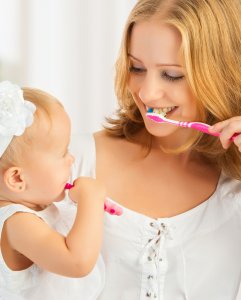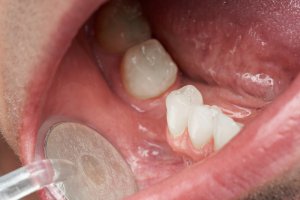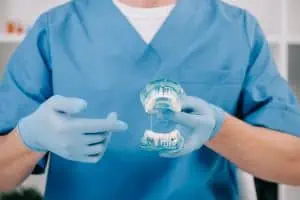We use our teeth all the time, yet we rarely give them much thought. But, if you’ve ever wondered “How many teeth do adults have?”, you’re in the right place to find answers.
We could just tell you that a full set of adult teeth consists of 32 teeth, including wisdom teeth. However, it’s actually not that simple. Many people have fewer teeth than this, even though they have never had any teeth removed. Why? Keep reading to find out.
We will also discuss:
- How many teeth kids have?
- The names and functions of all the different teeth in the human mouth
- How many teeth do we need?
- Tips for keeping your teeth healthy
So, whatever information you’re seeking about baby and adult teeth numbers, and how they impact oral health, you should find it here.
How many teeth do humans have?

We humans have two separate sets of teeth in our mouth in a lifetime. One set replaces the other as we grow up. In our childhood, we have baby teeth, or deciduous teeth. They are replaced by permanent teeth in early adolescence.
Let’s discuss baby teeth first.
How many teeth do kids have?
How many milk teeth do we acquire in childhood? The answer is 20. Out of these, 10 are situated in the top jawbone or the maxillary arch, while the other 10 are at the bottom in the mandibular arch.
Between the ages of about 6 months and 33 months, children develop a whole set of teeth known as baby teeth. Also known as ‘milk teeth’, these are temporary and meant to fall out gradually as we grow.

Based on their unique shape, structure, and function, baby teeth are divided into three classes:
- 8 incisors
- 4 canines
- 8 molars
Incisor teeth
Incisors are the front four teeth in both the upper and lower jaws. There are eight of them and they are primarily used for cutting and slicing food. Out of these, the two teeth in the middle are known as the central incisors, and the two on the left and right sides are called lateral incisors.
Canine teeth
Also called cuspid teeth, canine teeth are used for tearing and cutting food. Canine teeth are similar in number, in both the primary and secondary set of teeth. Two canine teeth are present in the upper jaw and two in the lower jaw.
Molar teeth
Molars are known for their broad grinding surface which helps in mashing food and making it easier to swallow. There are a total of eight molars in children, four of which are known as first molars and the other four as second molars.
First molars come right after the canine teeth and second molars come next to the first molars as the last teeth in the back of the mouth.
For more information about baby teeth, how they erupt, and when they fall out, check our full guide to milk teeth.
Why is it important to look after baby teeth?
Many people believe that the first set of teeth is not as important as they are eventually going to fall out. This is a common misconception for multiple reasons:

- Without proper cleaning, milk teeth can easily develop decay. If this reaches the inner tooth structure it will be very painful for the child.
- Decay can spread to the permanent teeth growing underneath if it’s not treated.
- Infected teeth may need to be extracted, which can affect how the other teeth grow in and may cause crookedness.
- Having teeth removed in a hospital can be traumatic for a child and may lead to fear of the dentist later in life.
- Children who are missing teeth prematurely may experience problems with eating and speech development.
Our complete guide to children’s oral health explains a lot more about how to care for your child’s teeth and avoid these kinds of problems.
How many teeth do adults have?
There are a total of 32 teeth in an adult set. Of these, 16 teeth are in the upper jawbone (maxillary arch) and 16 are in the lower jawbone (mandibular arch). This number includes four wisdom teeth. However, some people are missing one or more of these so actually have less than 32 teeth naturally.
Unlike baby teeth, adult teeth are divided into four different classes based on their shape and function:
- 8 incisors
- 4 canines
- 8 premolars
- 12 molars
Incisor teeth
An adult has eight incisor teeth, similar to children. There are two central and two lateral incisors in both upper and lower jaws. These incisors are used to cut or tear into food.
Canine teeth
You have four canine teeth in your permanent, or adult, set. These can be found next to the lateral incisors in both the upper and lower jaw. The pointy shape of the canines helps in the shredding of food.
Premolar Teeth
Premolars, or bicuspids, are the teeth that differentiate the adult set from the baby set of teeth. There are a total of eight premolars that are located between the permanent canines and the permanent molars. They occupy the position that has been vacated by the 1st and 2nd molars in your baby set of teeth.
Molar teeth
There are a total of 12 molars in an adult set of teeth, six of which are situated on the top jaw and six on the bottom. Molars have a broad chewing surface and are used for grinding and chewing food to make it easier to swallow and digest.
How many wisdom teeth do we have?
There are four wisdom teeth in a full set, but some people have fewer than this (and some wisdom teeth never erupt, so you can only see them on an x-ray). If you have only one, two or three wisdom teeth – or none at all – you can probably count yourself lucky!
The third set of molars, comprising the last teeth in the back of the mouth, are the wisdom teeth. Wisdom teeth are the last teeth to erupt, usually between the ages of 17 and 21. They are often removed because of complications due to a lack of space in the jaw.
How to count teeth
Dentists have a way of numbering teeth to keep track of them. To find out how dentists count teeth, watch the explanation from Dr Constance Wong below and you’ll be able to understand what’s going on at your next checkup!
When do permanent teeth come in?
In normal circumstances, baby teeth start to fall out around age five or six and are gradually replaced by permanent teeth. All permanent teeth, except wisdom teeth, should erupt by the age of 12 or 13.
Permanent teeth usually appear in a particular pattern, with the lower teeth emerging a little while before their upper counterparts. The table below shows normal eruption pattern and timings, but not everyone’s teeth will follow this precisely so don’t be alarmed if you or your child experience something slightly different.
Type of Adult Tooth | Age of Eruption - Lower | Age of Eruption - Upper |
Central incisors | 6-7 years | 7-8 years |
Lateral incisors | 7-8 years | 8-9 years |
Canines (cuspids) | 9-10 years | 11-12 years |
First premolars (first bicuspids) | 10-12 years | 10-11 years |
Second premolars (second bicuspids) | 11-12 years | 10-12 years |
First molars | 6-7 years | 6-7 years |
Second molars | 11-13 years | 12-13 years |
Third molars | 17-21 years | 17-21 years |
Do all adults have 32 teeth?

No, not all adults have 32 teeth . Some people naturally have fewer than 32 adult teeth, and the most common reason for this is that they are missing wisdom teeth. Wisdom teeth are the last to erupt in your mouth and are so-called (although inaccurately) because they were thought to be connected to the actual development of wisdom.
It’s quite common to naturally have 31, 30, 29 or 28 teeth because you have a reduced number of wisdom teeth – or none at all!
There is also a genetic condition called hypodontia which causes teeth to be missing. It’s thought that around 1.6% to 6.9% of the population are naturally missing one or more teeth (excluding wisdom teeth). This condition is most likely to affect the second premolars and the lateral incisors.
On the other hand, it’s also possible to have more than 32 teeth. People with more teeth than normal have a condition called hyperdontia. It’s quite rare, affecting just 3% of the population. Both hypodontia and hyperdontia are more likely to affect adult teeth than milk teeth.
How many teeth do we need?
You must be thinking if we could survive with 20 teeth in a baby set, do we need all 32 teeth in our mouths? Do we need to replace teeth if we lose them somehow?
We have established by now that there are 32 teeth in our mouths, each of which has a specific role and function. When you chew your food, 80% of the work is done by the first molars. Second and third molars work together with the first molars and assist them in their job, although some people have their third molars removed because of overcrowding or other problems.
If you lose some of your teeth for whatever reason, the workload will be automatically re-distributed among the remaining teeth. This may burden them over time, leading to diseases of the gum and tooth.

You might develop tooth decay, cracks and fractures, and sometimes even gum disease. Therefore, a lost tooth should be replaced as early as possible. Failing to replace one single tooth could lead to damage among the remaining teeth over time. We’ve written a separate article about the options for replacing missing teeth if that’s something you need to look into.
There is a popular saying in the medical world that people who have all their teeth will live a longer life. Although initially used as a marketing tactic, recent research has found a strong relationship between the number of teeth in the oral cavity and the general health of a person.
For example, if you develop heart disease, one of the most important questions asked by the healthcare practitioner will be about your oral health history. This is because there is a strong relationship between gum disease and cardiovascular problems. Similarly, research has also shown that gum disease impacts joints and eyes.
The crux of the matter is that taking good care of your oral hygiene and not losing any teeth can eventually lead to a healthier and longer life.
Tips for keeping your teeth healthy
When it comes to oral hygiene, brushing is the most important part. According to dentists, you should brush at least twice a day. It’s also important to choose the best toothpaste for your needs. Fluoride toothpastes are often considered better than those without fluoride, and you might want to address specific problems like sensitivity or bleeding gums.
A very common cause of tooth problems is improper brushing. You might be brushing twice a day but find that you are still suffering from tooth decay due to incorrect brushing techniques. You can learn how to brush your teeth correctly if you have any doubts.
Additionally, you may also follow the tips mentioned below:

- Add flossing to your daily oral hygiene routine
- Use a mouthwash, preferably a fluoridated one, at least once a day (but not straight after brushing)
- Less sugar intake is beneficial to both your dental health and overall health
- If you have a bad habit of clenching or grinding teeth and biting on hard objects, take steps to avoid it
- Visit your dentist regularly. Twice a year is enough if your teeth don’t demand extra care.
Conclusion
So, how many teeth do we have? The answer is 20 milk teeth which gradually fall out to make way for a set of 32 adult teeth – or perhaps a few less, depending on how many wisdom teeth you develop.
Each of these teeth in both sets is equally important and, therefore, must be taken care of if you wish to enjoy good oral health.
FAQs
Why are wisdom teeth removed?
The eruption of wisdom teeth is a painful process for most of us. The pain is usually due to decreased space in the mouth which leads to eruption at an angle or a partial eruption. Also known as impacted wisdom teeth, these teeth can adversely affect the jaw and cause improper alignment of the rest of the teeth. There can also be an increased risk of decay or plaque. Due to all these problems, around 60% of people get their wisdom teeth removed.
Is it okay to have 28 teeth?
Yes, having 28 teeth is perfectly normal. In fact, many people only have space for 28 teeth in their mouths, so if you’re missing your four wisdom teeth, you have escaped some dental work.
How many teeth do kids lose?
All children acquire a temporary set of 20 milk teeth over the first few years of their life, which should fall out one by one over a period of several years and are replaced by permanent teeth.
Archives of Oral Biology. Mineralization differences between human deciduous and permanent enamel measured by quantitative microradiography. Consulted 23rd January 2020.
NHS. Teeth facts and figures. Consulted 17th March 2020.
NCBI. Number of remaining teeth and health-related quality of life: the Korean National Health and Nutrition Examination Survey 2010–2012. Consulted 7th Feb 2023.




